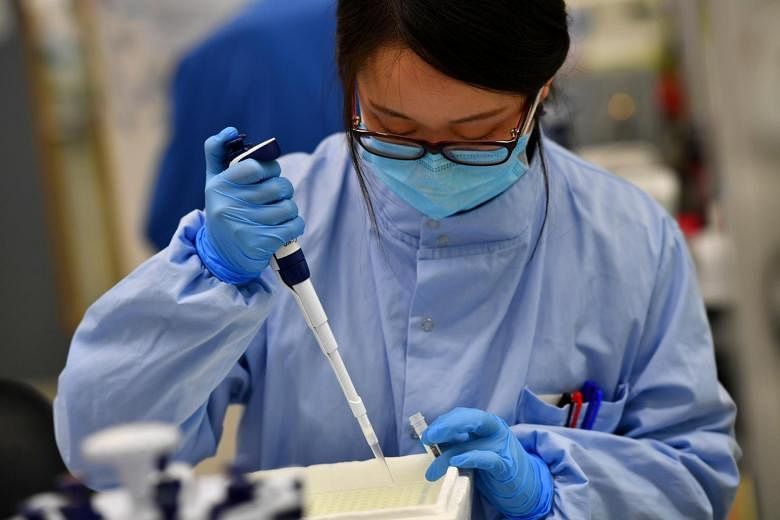BANGKOK - As the world works to vaccinate populations against Covid-19, with billions of jabs administered so far, the search for treatment options has proven to be trickier.
It is almost two years into the pandemic, but there is no cure yet for Covid-19. The handful of treatments being used now largely only treat Covid-19 symptoms or prevent the illness from becoming more severe.
And of the various therapeutics being studied, some are showing hopeful signs of combating the virus, but many are still in various stages of research.
It is a race against time for major pharmaceutical firms and scientists worldwide, including in China, South Korea, Japan and India.
Finding effective Covid-19 treatments is crucial because the pandemic is far from over, say medical experts, noting that treatments are just as important as vaccines.
"Vaccines and treatments have different functions: vaccines prevent the disease whereas treatments act once the person gets sick.
"Vaccines are useless once the disease has started. Treatments cannot prevent the disease in the long term," Dr Anne Gatignol, a professor at the McGill University's Department of Medicine, told The Straits Times.
According to a Covid-19 treatment tracker by FasterCures, which is under think-tank Milken Institute, there are 331 treatments being studied right now.
While a "one-stop" cure has yet to be found, a handful of treatments are currently used worldwide to aid patient recovery. These include the antiviral medication remdesivir, the steroid dexamethasone, and monoclonal antibodies, which are laboratory-made proteins that mimic natural antibodies to fight off infection.
However, these drugs are not "one size fits all", said Dr Shmuel Shoham, an infectious diseases expert at Johns Hopkins University School of Medicine.
"Right now, there isn't a pill which one can take at home. But once this is found, it will change things," said Dr Shoham, noting that such a treatment can be taken in the early stages of infection, and when combined with vaccines, could even bring Covid-19 mortality rates to zero.
Currently, some front runners in the antiviral experimental pill race include Merck & Co and Ridgeback Biotherapeutics' molnupiravir, Pfizer's PF-07321332 and AT-527 by Roche and Atea Pharmaceuticals.
On Thursday (Sept 30), Merck said molnupiravir is "likely to be effective" against known variants of the coronavirus, including the highly transmissible Delta variant that has driven major outbreaks in many countries like India, Thailand, the United States and Sweden.
Countries are also advancing in their search for domestically developed Covid-19 medications, with a number of potential cures entering late stage clinical trials.
One antiviral pill developed by Japan's Shionogi & Co began Phase 2/3 clinical trials this week, and could receive approval by the year-end. The drug, S-217622, which is meant for patients with mild symptoms, inhibits the activity of an enzyme necessary for the virus to replicate.
Another study by Japan-based Chugai Pharmaceuticals, a subsidiary of Roche, is being done on antiviral drug AT-527.
In South Korea, a monoclonal antibody treatment by local pharmaceutical giant Celltrion has already received the full approval this month, following emergency approval in February.
The drug Regkirona, given via intravenous infusion, is used for high-risk patients with non-severe symptoms and all patients with moderate and serious symptoms. An inhalable form of the drug is also in the works.
Meanwhile, biopharmaceutical firm GeneOne Life Science got approval earlier this month to start Phase 2 clinical trials in South Korea for its oral treatment GLS-1027.
The government is also trying to encourage more companies to develop domestic oral drugs and said it will cover the costs of buying the treatment.
A total of 11 oral drugs are being developed in South Korea, including those originally made to treat illnesses like malaria and pancreatitis.
The Hong Kong government has also backed research by medical schools. In April last year, it approved HK$111 million (S$19.4 million) in funding for studies on Covid-19 vaccines, novel antiviral drugs and effective therapeutic interventions.
There are also studies that focus on repurposing medication for Covid-19, which include interferon beta-1b and clofazimine, said University of Hong Kong's Professor Ivan Hung, who is involved in some studies. The two drugs are for treating relapsing forms of multiple sclerosis and leprosy respectively. He added that Hong Kong researchers are also developing novel intranasal Covid-19 vaccines.
What is lacking in therapeutics now are effective and specific antiviral drugs that can be orally administered safely to a large number of infected and exposed individuals at an early stage, Dr Leung Chi Chiu of the Hong Kong Medical Association told ST, adding that this would complement vaccines in controlling the pandemic.
In April this year, University of Hong Kong and researchers of the Icahn School of Medicine at Mount Sinai in New York said they found that a widely available and inexpensive chemotherapy drug - topotecan - reduced morbidity and mortality in mice infected with Covid-19.
Studies on the safety and efficacy of the drug have begun at clinical sites around the world, including India.
In India, Regen-Cov, a cocktail of two monoclonal antibodies developed by American biotech firm Regeneron, was granted emergency use authorisation in May after local patients showed quick recovery, even without hospitalisation and medication in some cases. However, at 60,000 rupees (S$1,100) per dose, it might only be accessible to more affluent patients.
Scientists have come up with an affordable "adjunct therapy" called drug 2-deoxy-D-glucose or 2-DG, which costs about 1,000 rupees. It was developed by the Defence Research and Development Organisation with Hyderabad-based pharma company Dr Reddy's Lab.
The drug, which comes in powder form, was initially developed to treat cancer but has now been approved to treat Covid-19 in India.
Health experts, however, question its efficacy, as data about its performance in human trials is not yet published. It was also not approved for cancer treatment even after prolonged use.
Meanwhile, China is touting what could be the world's first Covid-19 treatment made from the plasma of vaccinated individuals.
Developed by Beijing Tiantan Biological Products and administered by China National Biotec Group (CNBG), a Sinopharm subsidiary, the drug was approved for clinical trials in late August.
"The drug can have therapeutic effects on people with moderate or severe illnesses," CNBG vice-president Zhu Jingjin told state broadcaster CCTV earlier this month.
In China, hospitals have also been adding traditional Chinese medicine into treatment regimes which involve the use of ingredients such as apricot seeds and licorice root.
- Additional reporting by Chang May Choon, Claire Huang, Elizabeth Law, Rohini Mohan and Walter Sim












